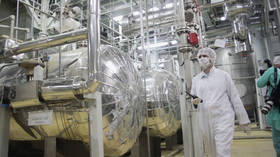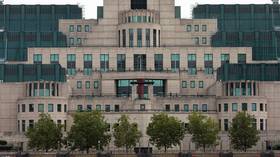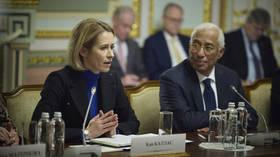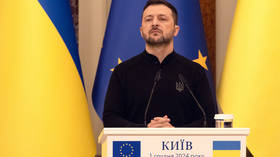Joe Biden has a very short window of opportunity in which America’s return to Iran nuclear deal is possible

The assassination of Iran’s top nuclear scientist appears designed to provoke Iran into retaliating, triggering a conflict that would kill the nuclear deal just as Joe Biden indicates the US wants back in. But who trapped whom?
The murder of Dr. Mohsen Fakhrizadeh on November 27, just outside the Iranian capital of Tehran, was an act of such brazenness that most observers expected Iran to lash out in retaliation. Fakhrizadeh, whom the West claims was the “father” of Iran’s nuclear program, had lived a life in the shadows, where his existence, let alone his work, was barely acknowledged by Iran.
Iran has placed the blame for the assassination squarely on both Israel and the United States, neither of which have officially commented on Fakhrizadeh’s death. The killing, coming as it did amid a contentious US presidential transition, seems deliberately timed to provoke a crisis between the US and Iran that would slam the door shut on any effort by President-elect Joe Biden to seek to improve relations between the two nations once he assumes office on January 21. Biden has indicated he would be inclined to rejoin the landmark 2015 Joint Comprehensive Program of Action, or JCPOA, better known as the Iran nuclear agreement; President Trump’s precipitous withdrawal from that agreement in May 2018 led to the current crisis between Iran and the US.
Also on rt.com US officials anonymously blame Israel for assassinating Iran’s top nuclear scientist – reportsBoth the US and Israel have likened Fakhrizadeh to Robert Oppenheimer, the “father” of the US atomic bomb who headed up the Manhattan Project during the Second World War. But there is one major difference – Oppenheimer ran a nuclear weapons program; Fakhrizadeh, despite all the Western hype surrounding his existence, did not.
A trained nuclear scientist, Fakhrizadeh taught physics at the Imam Hussein University in Tehran. In 1998 he took over the helm of the Physics Research Center, which served as the procurement front for Iran’s acquisition of sensitive technology and know-how pertaining to the use of centrifuges for the enrichment of uranium. Under Fakhrizadeh’s leadership, Iran was able to procure enough material to create its own indigenous centrifuge enrichment capability, which it installed at a massive underground facility in Natanz.
Iran has always maintained that its pursuit of uranium enrichment was, and is, exclusively in support of the kind of peaceful nuclear energy programs permitted under the Nonproliferation Treaty (NPT), which Iran is a signatory. Article IV of the NPT allows member nations to possess the entire fuel cycle used in nuclear power, to include the enrichment of uranium for fuel. The crux of the issue confronting the West, and in particular Israel and the United States, is that the same technology that is used to enrich uranium to the 3.5-5 percent level used in the kind of nuclear reactor in operation in Iran today can be used, with slight modifications, to enrich uranium up to the 90 percent-plus level that is used in nuclear weapons.
From the perspective of Israel, all uranium enrichment capability in the possession of Iran must be considered in terms of its military potential. Seen in this light, the JCPOA, which granted Iran the right to enrich uranium under certain restrictions, was and would always be problematic for Israel. Israel lobbied the Obama administration hard against joining the JCPOA, and once President Trump took office, Israel continued this effort, this time succeeding in getting Trump to withdraw.
But the American withdrawal did not bring an end to the JCPOA. In fact, the combination of the resumption of US economic sanctions and the pressure placed on Europe by the US to cease all economic trade with Iran has allowed Iran to invoke Articles 26 and 36 of the JCPOA, which permit Iran to pull back from its commitments under the deal so long as other parties are in noncompliance (the US, having withdrawn, is no longer a party to the agreement. Europe, including France, Germany, the United Kingdom and the European Union, are parties, and as such obligated to trade with Iran as part of the agreement; US secondary sanctions targeting European companies that do trade with Iran have shut down this mandatory activity, placing Europe in noncompliance.)
Since May 2019, Iran has systematically pulled back from all its commitments under the JCPOA regarding limitations on the numbers and types of centrifuges in operation, the level of uranium enriched, and the amount of low-enriched uranium it has stockpiled. The only restriction which remains in place are the provisions for enhanced IAEA Safeguards inspections known as the Additional Protocol.
The Iranian Parliament, in a response to Fakhrizadeh’s murder, recently passed legislation which would end Iran’s voluntary compliance with the Additional Protocol inspections, and make the other Iranian actions permanent in nature, which would have the effect of killing the JCPOA. Iran’s President Hassan Rouhani had long held that if the US were to rejoin the nuclear deal and lift economic sanctions, then the actions Tehran took in disregarding the JCPOA restrictions would all be reversible in short order.
Also on rt.com ‘Not useful’: Iranian govt speaks out against its parliament backing an end to international inspections of nuclear sitesAt the time of his death, Fakhrizadeh was the head of the Research and Innovation Organization (RIO), part of the Iranian Defense Ministry. A June 2020 report on nonproliferation published by the US Department of State alleges that Fakhrizadeh used the RIO “to keep former weapons program scientists employed… on [nuclear] weaponization-relevant dual-use technical activities… to aid in any future nuclear weapons development work in the event that a decision were made to resume such work.”
This belief, when combined with Iran’s decision to cease abiding by provisions of the JCPOA regarding the stockpiling of low-enriched uranium and the use of advanced centrifuges to enrich uranium, had the de facto effect of signing Fakhrizadeh’s death warrant; the Iranian scientist was murdered under a false pretext, promoted by Israel and sustained by the US, that Iran had, and was continuing to, pursue a nuclear weapons capability.
Israel has a long history of undertaking covert direct action against Iran’s nuclear program. In 2009-2010, Israel allegedly worked with US intelligence to launch a cyberattack using the Stuxnet virus to infect Iranian centrifuge operations at Natanz. This was followed by a program of targeted assassinations which killed four Iranian nuclear scientists between 2010-2012 (a fifth attack narrowly missed killing the head of the Iranian Atomic Energy Organization.) Israeli intelligence is believed to be behind a series of mysterious explosions at the Natanz enrichment facility earlier this year which caused significant damage and disruption to Iran’s centrifuge program. Fakhrizadeh’s killing could logically be viewed as a continuation of Israel’s alleged efforts to degrade Iran’s nuclear capabilities.
For its part, Iran has promised to retaliate not only for the murder of Fakhrizadeh, but also the previous assassination of General Qassem Soleimani in Baghdad on January 3 of this year, carried out by US drones acting on intelligence provided by Israel. But in both cases, Iran has been careful not to allow itself to be provoked into carrying out any action which would trigger a broader conflict that would have the effect of killing any chance of the US rejoining the JCPOA and Iran getting the crippling economic sanctions lifted.
The Iranian government spokesman, Ali Rabiei, in a statement issued after Fakhrizadeh’s murder said that the Islamic Republic “shouldn’t fall into the trap of linking the assassination to past nuclear negotiations.” In short, Iran would do everything possible to make sure that the conditions existed that would facilitate the US rejoining the JCPOA, if in fact that was the course of action desired by a Biden administration.
With Iran refusing to take the bait, both Israel and the Trump administration are in a position where they find themselves seeing the anti-Iranian project they have conspired on over the past four years collapse in the face of a Biden administration which recognizes the reality that the best way forward regarding Iran is the path offered by diplomacy.
Both Israel and the US were prepared to launch limited counterstrikes to any Iranian retaliation, with the goal of creating enough conflict to kill the nuclear deal, but without triggering the kind of all-out war with Iran that would devastate the region. Void of any Iranian ‘trigger’, the Trump administration has deployed nuclear-capable B-52 bombers to the region, redeployed the USS Nimitz aircraft carrier and its associated battlegroup, and deployed a squadron of advanced fighters from Europe to the Persian Gulf, all in an effort to ‘deter’ any Iranian aggression that might be carried out by Iran directly, or indirectly through Iranian proxies (the current US “intelligence” holds that pro-Iranian militias in Iraq might take advantage of the US withdrawal of forces ordered by President Trump and attack the US in Iraq).
Also on rt.com Rouhani accuses Israel of assassinating Iranian nuclear scientist to drag region into warIran’s refusal to engage in any provocative actions, however, has in effect turned the trap set by Israel and the Trump administration around. The JCPOA came into being largely because of the threat of an Israeli attack on Iran if something was not done to curtail the growth of its uranium enrichment capability. In short, it was the threat of war which pushed the Obama administration to reverse course on its previous policy position of not allowing a single centrifuge to operate in Iran, to one where several thousand were in operation.
Joe Biden has indicated that he would be pushing for several conditions that would need to be met for the US to return to the JCPOA under a Biden administration. For its part, Iran has made it clear that it would not tolerate any such demands; the incompatibility in these two positions, if left to their own devices, would probably have spelled the death knell of the JCPOA.
Thanks to the murder of Mohsen Fakhrizadeh, however, Israel and the Trump administration have once again allowed the specter of war to cloud US policy positions when it comes to Iran’s nuclear program.
Joe Biden will have a very short window of opportunity in which a US return to the JCPOA is possible, what with the Iranian Parliament’s new nuclear legislation, and the upcoming Iranian presidential elections scheduled for June 2021 which will see a moderate, Hassan Rouhani, step down, and the likelihood that he will be replaced by a hardline conservative president not inclined to negotiate with the US.
There will be no time for any US diplomatic trickery or finessed negotiations over conditions for its return to the JCPOA. Thanks to Fakhrizadeh’s murder, the US is now faced with the choice of either returning to the nuclear deal without any preconditions, or watching Iran withdraw totally, thereby triggering the Israeli military response that the JCPOA was designed to prevent in the first place.
The ‘Fakhrizadeh trap’ set by Israel and the Trump administration to kill the JCPOA seems to have created the conditions for its survival, given that the last thing a Biden administration will want is a major regional war that would significantly disrupt the global economy at the very time the world is trying to come out under the shadow of the Covid-19 pandemic.
Think your friends would be interested? Share this story!
The statements, views and opinions expressed in this column are solely those of the author and do not necessarily represent those of RT.














